Manual or Automated? The Role of ERP in Improving Time Management for Restaurant Managers
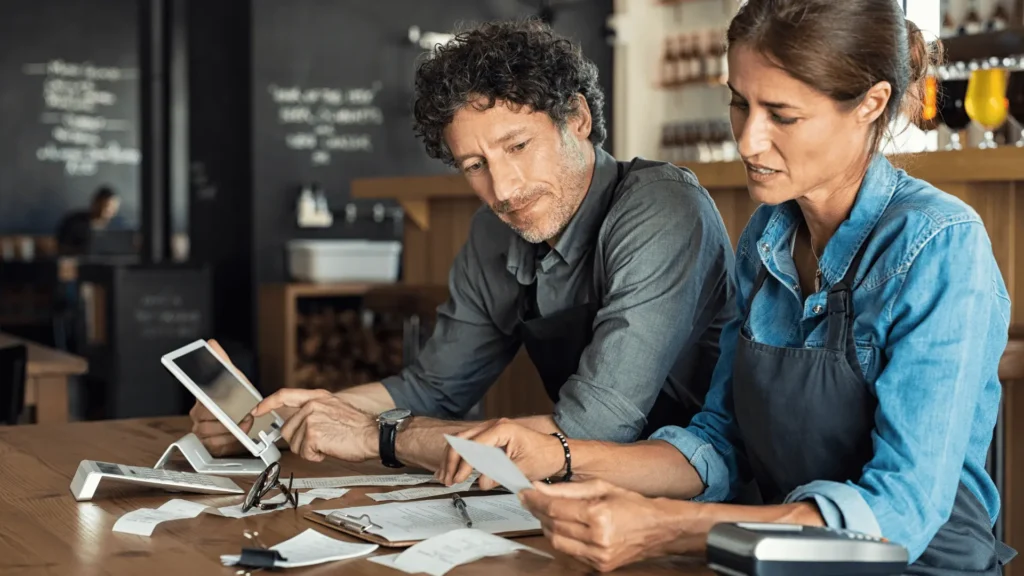
Introduction
Being a restaurant manager is one of the most demanding jobs in today’s workforce. The role involves long, irregular hours, including weekends and holidays, while requiring managers to juggle unpredictable tasks, meet customer expectations, and navigate staff management challenges.
In this blog, we’ll uncover what consumes the most time when managing a restaurant, how much time is spent on these tasks, and how manual processes compare to automated solutions, supported by an ERP (Enterprise Resource Planning) solution for improving time management in restaurants.
What takes time when managing a restaurant
Managing a restaurant takes time due to tasks like tracking inventory, scheduling staff, processing orders, and handling finances manually. Without an ERP system that automates most of these tasks, they can occupy a significant amount of time, require a lot of attention, and when multitasking, as it is often the case in the restaurant industry, this can lead to errors, making operations less efficient, increased pressure and stress.
In fact, a study conducted by Harvard Business Review found that restaurants that are using an ERP solution to manage their operations boost their efficiency by 15-20% compared to those that are not using an ERP system.
Here’s what takes time when managing a restaurant:
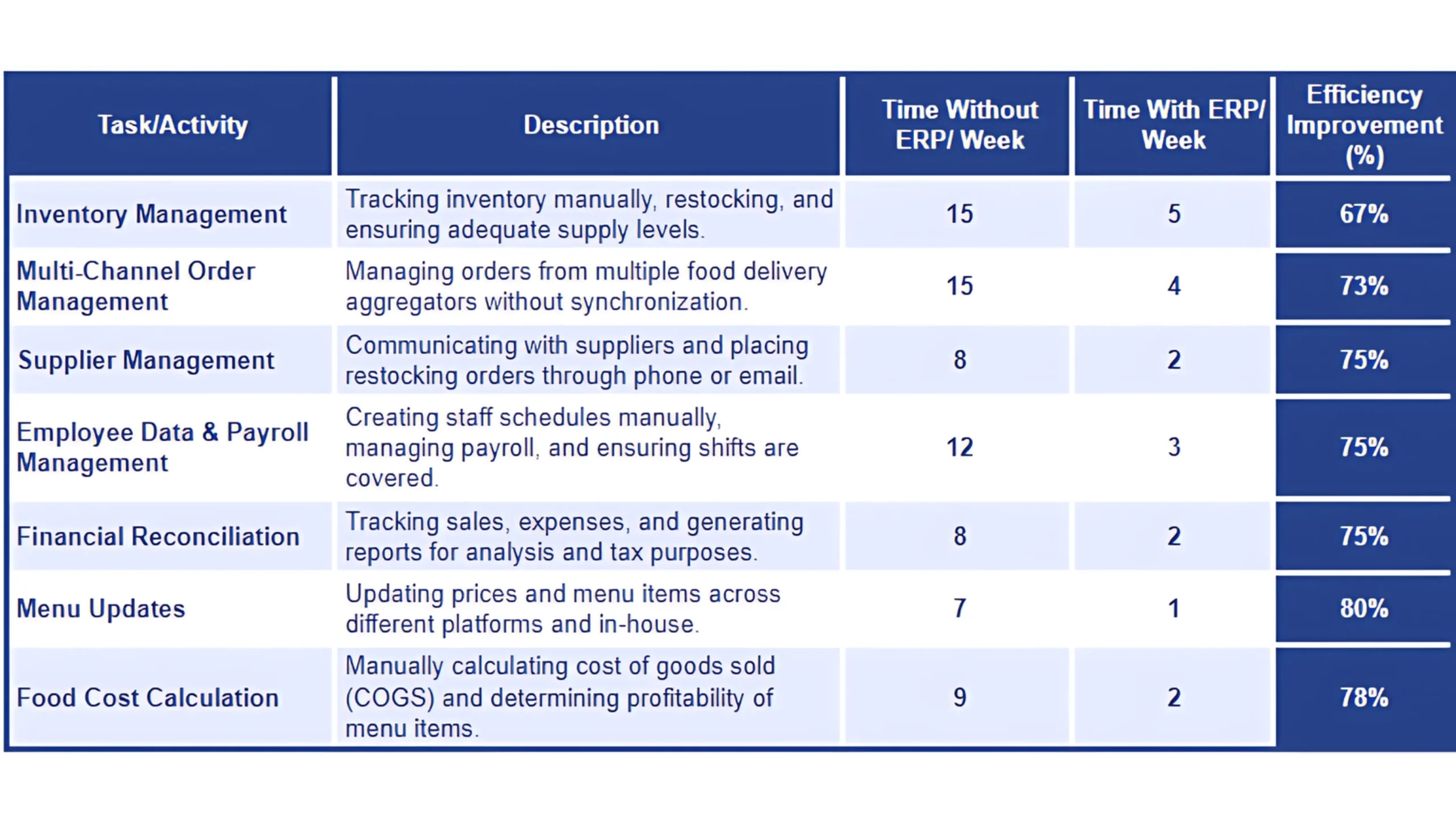
Restaurant Inventory Management
Restaurant Inventory Management handled manually
In the absence of an ERP system, inventory management for restaurants can be a very tedious task, with multiple manual processes, which are prone to human errors. From tracking inventory levels manually, to understanding the available quantity for each item, to restocking, making sure that the ordered items and quantities match the ordered ones, and to constantly monitoring supply levels, this activity alone can take around 15 hours per week.
During this tedious process, mistakes may occur at different stages, which will affect the profitability of the business. In addition, with many tasks being conducted manually, efficiency will also be affected, and this also translates into losing money through higher labor costs or waste, when items in the inventory overpass the expiration date, due to manual errors in inventory management.
Restaurant Inventory Management handled with an ERP System
When a restaurant uses an ERP system for inventory management, the entire process becomes streamlined and automated, reducing the need for manual input. The system automatically tracks inventory levels in real-time, giving managers an accurate view of stock quantities at any moment. Restocking is simplified through automated alerts when supplies run low, and orders can be placed directly with suppliers through the system.
The ERP also ensures that items and quantities received match the orders placed, minimizing errors. This automation reduces the risk of human mistakes, improves efficiency, and ultimately saves both time and money by cutting down labor costs and minimizing waste.
Altogether, these multiple activities involved in restaurant inventory management will occupy no more than 5 hours per week in a restaurant manager’s schedule, increasing efficiency by around 67% compared with restaurants that are not using an ERP solution.

Multi-Channel Order Management
Multi-Channel Order Management handled manually
Order processing in restaurants refers to the steps involved in receiving, managing, and fulfilling customer orders. It includes taking orders from various channels like dine-in, takeout, phone orders, and online food delivery platforms (e.g., Deliveroo, Talabat, Zomato, etc.).
In restaurants that are not using an ERP system, multi-channel order management is handled manually, requiring staff to manage orders from various platforms. This fragmented approach is susceptible to errors, such as missed or duplicated orders, and can lead to delays in processing, inaccurate inventory tracking, and overwhelmed staff. Managing these orders manually can take around 15 hours each week (more or less depending on the complexity of the F&B business), reducing efficiency and increasing the likelihood of customer dissatisfaction.
Multi-Channel Order Management handled with an ERP System
With an ERP system, order processing is automated and streamlined, consolidating orders from dine-in, takeout, and online platforms into one place. This reduces manual input and ensures accurate communication with the kitchen.
With an ERP system, multi-channel order management is centralized, allowing restaurants to handle multiple delivery platforms like Talabat, Deliveroo, and ChatFood all within a single dashboard. This unified platform ensures that orders from various sources are seamlessly integrated and processed in real time, eliminating the need to juggle multiple systems. In addition, the ERP system also centralizes in-person and phone orders by directly syncing them into the same system, ensuring consistent tracking, accurate inventory management, and streamlined processing across all order channels.
Overall, this activity takes no more than 4 hours per week, assures error-free service, even during peak times, and improves the business efficiency by 67%.

Supplier Management
Supplier management handled manually
Managing supplier orders can take anywhere from 7 to 12 hours per week, depending on the complexity of the restaurant’s operations. This involves checking availability and prices with multiple suppliers, sometimes negotiating, and carefully placing restocking orders while aligning with inventory needs. Managers must also communicate via phone or email and follow up to ensure the orders are correctly submitted – a process that’s not only time-consuming and tedious but also prone to human errors.
Supplier management handled with an ERP system
With an ERP system, managing supplier orders becomes much faster and more efficient, taking only around 2 hours per week. The system automatically tracks inventory levels, generates purchase orders, and suggests what needs to be restocked, based on real-time data. Communication with suppliers is streamlined through automated processes, minimizing the need for back-and-forth emails or phone calls, reducing human error, and freeing up time for other tasks, such as focusing on delivering excellent customer service.
When an ERP system, like Polaris ERP is used, restaurants are improving their performance by 75%.

Employee Data and Payroll Management
Employee data and payroll management handled manually
Managing employee data and payroll manually in restaurants is time-consuming, taking up to 12 hours per week. This is because tasks like tracking work hours, calculating wages, updating employee records, and managing benefits require constant attention, leading to inefficiencies and a higher risk of human error. Without automation, managers must handle these repetitive tasks manually, slowing down operations.
Scheduling and staff management handled with an ERP system
With an ERP system in place, managing employee data and payroll becomes much more efficient, cutting down the time to just a few hours per week. Automation handles tasks like tracking work hours, calculating wages, and updating records, reducing manual effort and minimizing errors.
When using an ERP system for scheduling and staff management, the process becomes much faster, taking only around 3 hours per week, improving efficiency by 75%.
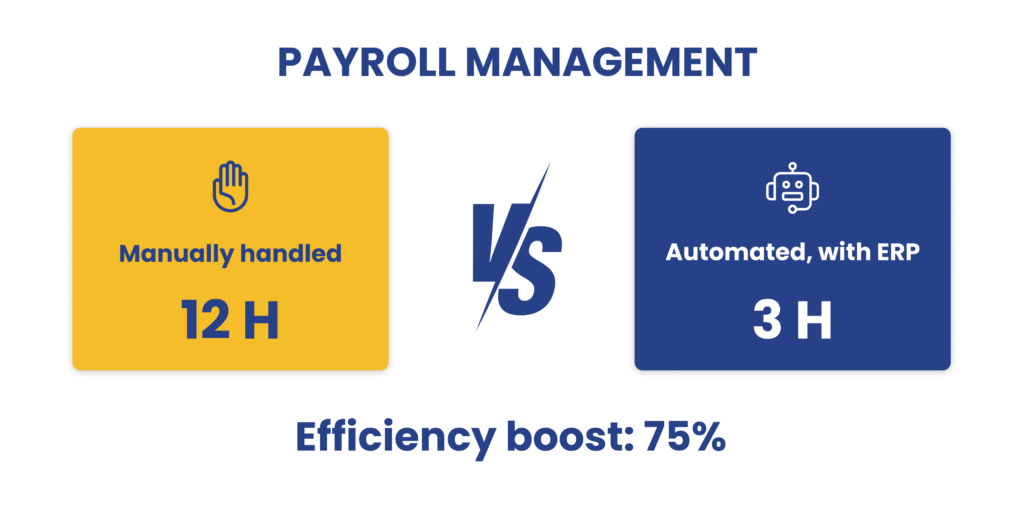
Financial Reconciliation
Financial reconciliation handled manually
Financial reconciliation is the process of comparing and verifying two sets of financial records to ensure they match and are accurate. This typically involves checking records from different sources, such as bank statements against internal accounting records, to identify and correct discrepancies. The goal is to ensure that all transactions are properly recorded and that the financial statements are accurate and reliable.
In a restaurant not using an ERP system, financial reconciliation becomes a cumbersome task involving manual tracking across multiple systems or spreadsheets. Staff must compare and match data from various sources like POS systems, accounting software, and bank statements, which is time-consuming and susceptible to human errors.
This process increases the risk of discrepancies, missed transactions, and inaccurate financial statements, and it’s also time consuming, as it can take up to 8 hours per week. Additionally, the lack of real-time data integration delays the identification of financial issues, affecting timely decision-making and overall financial management.
Financial reconciliation handled with an ERP System
In a restaurant using an ERP system, financial reconciliation is streamlined and efficient due to the system’s centralized nature. The ERP system consolidates data from various sources – such as POS systems, accounting software, and bank statements – into a unified platform, allowing for real-time updates and automatic cross-checking of financial records.
This reduces manual effort, minimizes the risk of errors, and ensures that discrepancies are quickly identified and addressed. The automation and centralization provided by the ERP system facilitate accurate and timely financial reconciliation, supporting better decision-making and financial management.
When using Polaris ERP, financial reconciliation is reduced to 2 hours per week, which improves the overall efficiency by 75%.

Menu Updates
Menu updates handled manually
In a restaurant not using an ERP system, menu updates can be time-consuming, taking up to 8 hours per week, and this is an activity that is exposed to human errors, as changes need to be manually applied across multiple platforms and systems. Staff must update each system separately, including POS, inventory, and pricing databases, which can lead to inconsistencies and delays in reflecting new menu items or changes.
This fragmented approach increases the risk of outdated or incorrect information being presented to customers and staff. It can impact the overall insights and data accuracy, making it harder to derive reliable insights for informed decision-making and strategic planning.
Menu updates handled with an ERP system
When a restaurant uses an ERP system for menu updates, the process becomes streamlined and efficient. The ERP system allows for real-time updates to be made across all integrated platforms simultaneously, ensuring consistency in pricing, item availability, and promotions. This centralized approach minimizes errors and ensures that changes are accurately reflected in POS systems, inventory management, and other relevant areas, leading to more reliable data and smoother operations.
Using an ERP system for menu updates reduces the work to approximately 2 hours on a weekly basis, improving efficiency by 80%.
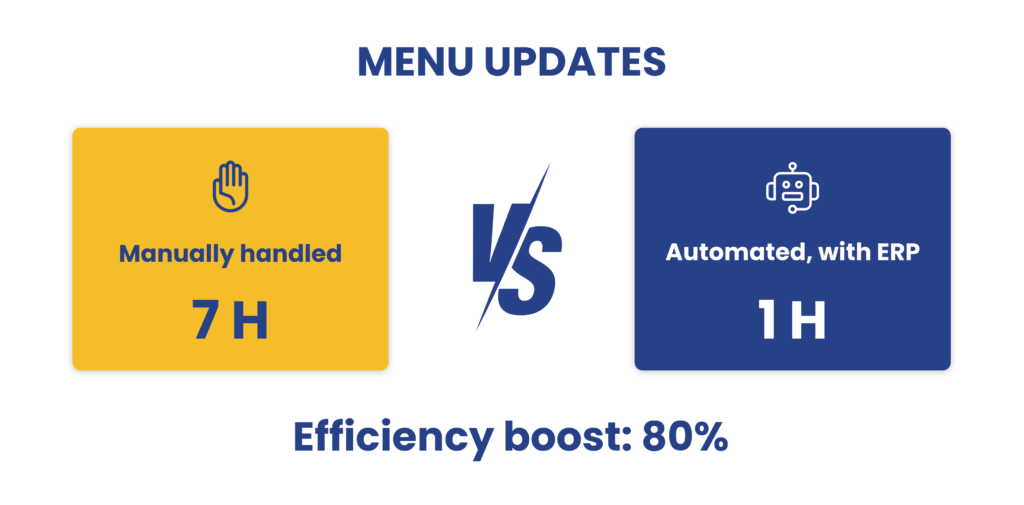
Food Cost Calculation
Food cost calculation handled manually
Calculating the cost of goods sold (COGS) for a restaurant without an ERP system can be quite challenging and labor-intensive. Without centralized data, restaurant managers must manually track inventory, purchase orders, and sales, often using spreadsheets or separate accounting systems.
This manual approach increases the risk of errors and inconsistencies, making it difficult to accurately calculate COGS. Additionally, it can be time-consuming to reconcile inventory records with sales data, potentially leading to delays in financial reporting and analysis. This activity alone can take up to 9-10 hours per week.
Food cost calculation handled with an ERP system
An ERP system significantly simplifies food cost calculations, because it connects the inventory with the sales and purchase data, being able to provide real time and accurate calculations of COGS instantly. In addition, an AI-Powered Food Cost Calculator within an ERP system, also provides smart recommendations, based on the real data of the restaurant.
Using an ERP system for food cost calculations cuts down time from around 9 to 2 hours per week, which boosts efficiency by 78%.
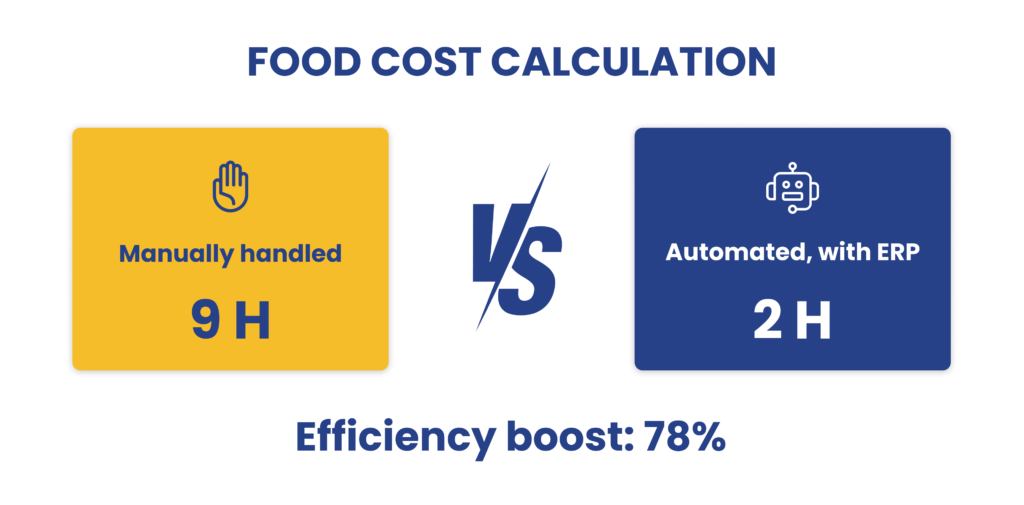
ERP Software Saves Time and Boosts Restaurant Growth
Managing a restaurant involves numerous time-consuming, often repetitive tasks that can be streamlined with an ERP system. By automating processes such as inventory management, order processing, supplier management, reconciliation, or payroll, restaurants can save significant time and reduce errors.
An ERP system not only enhances efficiency but also allows restaurant managers to focus more on delivering great service and improving profitability. Shifting to ERP technology can save, on average, 75% of the time dedicated to repetitive, manually handled tasks. This saved time can be dedicated to growing the restaurant, improving service and food quality, and enhancing the overall customer experience.
Contact Us & Book A Demo
5 Comments
Comments are closed.

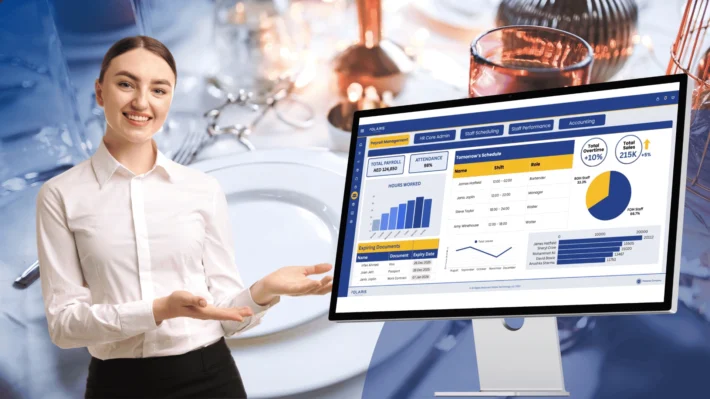


[…] The Role of ERP in Improving Time Management for Restaurant Managers […]
[…] Using a comprehensive system like Polaris ERP you can save up to 10 hours per week for inventory management (equivalent to 67% efficiency boost), or 11 hours on order management (equivalent to 73% increased efficiency). […]
[…] owners using Polaris ERP’s inventory management software have experienced an efficiency improvement of 67% in managing stocks. Tracking inventory manually, restocking, and ensuring adequate supply levels […]
[…] across periods or branches takes seconds. This efficiency can save managers 20-50+ hours per month (75% efficiency for financial reconciliation). Without it, preparing reports manually would take weeks, often with errors and outdated […]
[…] Time Saving for Managers and Purchase Teams […]